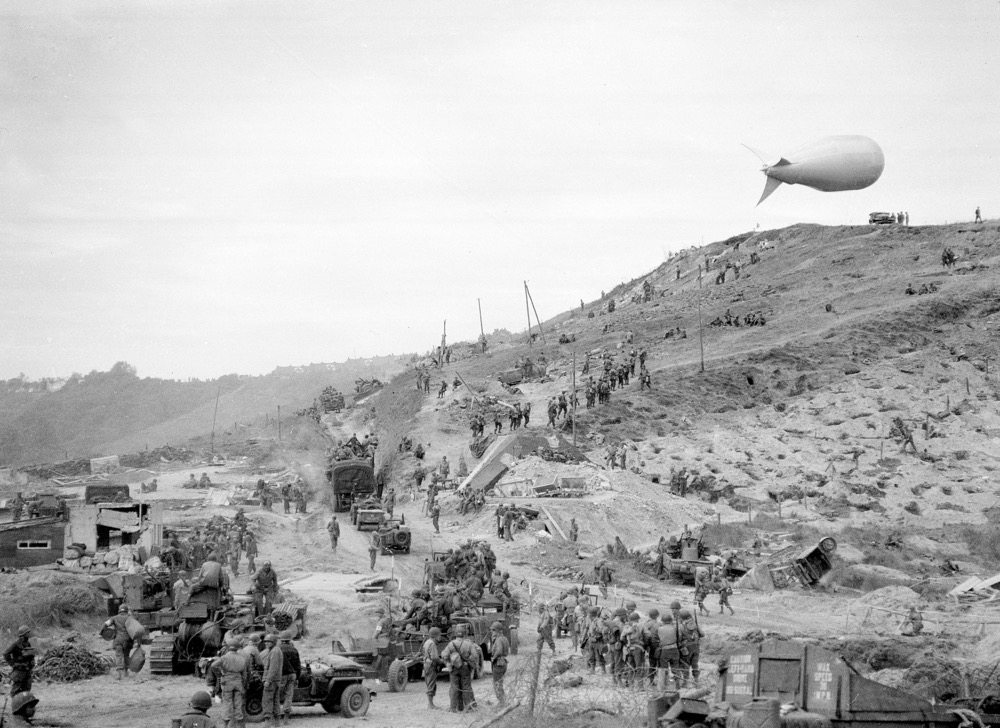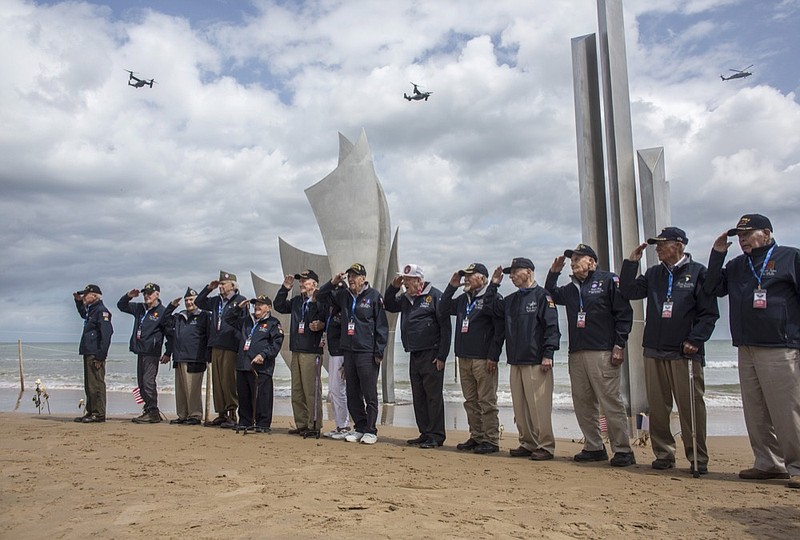FORT NECESSITY NATIONAL BATTLEFIELD, Pennsylvania (AP) - There are pieces of burned wood, unearthed decades ago. There is a spoon, a wine-bottle fragment, assorted pottery shards - all carefully curated and elaborately explained.
And then there is the patrician voice of George Washington: "I'm certain," he intones solemnly, "that if we didn't attack the French first, they would have tried to ambush us. It was clear that they were on the offensive."
Except, as is obvious, it's not the voice of George Washington at all. It is a performer, reading from his writing.
At Fort Necessity, the spot in Southwestern Pennsylvania's forested hills where an early "world war" among the English, the French and Native Americans began, history feels fascinating, meticulously preserved - and distant. Washington is 220 years gone, and the last survivor of the war that began here died in the early 1840s.
Last week, ceremonies marking the 75th anniversary of D-Day reminded us that an entire generation is fading from the world stage. But what happens to the collective perception of major historical events when all participants and firsthand witnesses pass from living memory, when none of our fellow humans can still answer the question: What was it like to be there?
"When the actual witnesses and participants pass from the scene, we lose something - morally, intellectually and emotionally," says Gregory Vitarbo, a military and European historian at Meredith College in Raleigh, North Carolina.
Most everyone views history through the prism of the particular present moment. But when the present moment still includes those who were part of that history, it adds depth and resonance to the proceedings.
This was evident last week on Omaha Beach in Normandy. Survivors, most more than nine decades old, brought the commemorations alive in ways that would have been impossible were they all gone, as they undoubtedly will be in a decade or so.
They talked of deafening noise, of heads bobbing in the sea, of "the acrid smell of cordite" from shelling. Their very demeanors - limber young fighters become stooped, slow-moving great-grandfathers - seemed to shout of connections with a past that, on most days, now seems remote.
Some of this is intangible, a matter of feelings. The closer you are to a watershed moment, the more likely it is to capture interest. This is why, for example, a fender-bender on the street outside your home is far more likely to grab your attention then the same event three counties away.
 FILE - In this June 10, 1944, file photo, U.S. troops move inland from an established beachhead at Omaha Beach in the Normandy region of France. Ceremonies marking the 75th anniversary of D-Day in June 2019, reminded us that an entire generation is fading from the world stage. (AP Photo/Jack Rice, File)
FILE - In this June 10, 1944, file photo, U.S. troops move inland from an established beachhead at Omaha Beach in the Normandy region of France. Ceremonies marking the 75th anniversary of D-Day in June 2019, reminded us that an entire generation is fading from the world stage. (AP Photo/Jack Rice, File)
Same thing goes for history. For many Americans growing up in the 1950s and 1960s, World War II was very much a thing of the present - their fathers had fought, and they brought tales of the war to the dinner table. Today, the ranks of those emissaries have thinned and the direct impact is reduced, so naturally the conversation around it fades.
That's why so much effort in exhibiting history at museums and historic sites these days employs sight, sound and touch - even for events that predated the technology to capture such across platforms. It's also why elaborate historical re-enactments, complete with clothing and firearms and language and food, have become so popular. It all points in the same direction - simulating what it might be like to talk to an actual participant.
That notion - keeping history as current as possible, and by extension as relevant as possible - has flourished in recent decades as immersive experiences become the norm and technology allows us to preserve more and more of the past's voices and vistas.
"It's not only what we remember, not only if we remember, but how we remember as well," says Fred L. Johnson III, a historian at Hope College in Holland, Michigan, and a former U.S. Marine.
"We see, we hear, we feel, we touch, we smell," he says. "Once you hold the paper, once you touch the headstone, once you hear the words, once you see the face . Suddenly it's not an abstract issue. Suddenly it's not back then. Suddenly it's happening right now."
But even the most immersive technology is not an actual human being recounting momentous experiences. Some of the most famous words about the importance of living memory fighting the ticking clock came from Holocaust survivor Elie Wiesel, who said, "For the dead and the living, we must bear witness."
For those who carry history also carry credibility, even if they experienced only a fragment of a vast tapestry. They can say incontrovertibly what others can only speculate at; they can be definitive about things that others are trying to claim or distort.
Rebecca A. Adelman, who teaches media and communication studies at the University of Maryland, Baltimore County, says such people can act as "a hedge against the abstraction that can happen when events are reduced to chapters in history and the sensationalism that often accompanies pop culture depictions."
When that happens, she says, "these events can be more readily reduced to symbols that can mean whatever someone wants them to mean."
For years before his death in 2017, a Holocaust survivor named Morris Glass visited Meredith College and spoke with students about his experiences. The house was always packed with students, Vitarbo says, and the visit was a keystone of the academic year.
Why? Because he could take one of the most traumatic events of the past century and bring it to human scale - and, just as important, answer questions about it interactively and indisputably.
"In an age of disputed facts, disputed truth, personal truth, 'my truth' and 'your truth', how are we going to get at the actual truth when the actual participants are gone?" wonders Jerald Podair, co-editor of "The Routledge History of the Twentieth-Century United States."
"I am very concerned that when the last of these guys passes on, we're going to start making up our own truth," says Podair, who teaches history and American Studies at Lawrence University in Appleton, Wisconsin.
Truth is always up for grabs in the end, and being there doesn't equal being right. The D-Day recollections of one American soldier at Omaha Beach may diverge from those of a British infantryman at Sword Beach. But people are more likely to engage with history if other actual people - not facts or data or even anecdotes - can act as guides and say, even in subjectivity-saturated ways: This is what it felt like.
The late American historian John Hope Franklin knew this. "We must get beyond textbooks, go out into the bypaths and untrodden depths of the wilderness and travel and explore and tell the world of the glories of our journey," he said, and his words tower over visitors who enter the Fort Necessity museum.
But when those who actually made the journeys are gone, and we have to strain to feel the hand of yesterday at work, history becomes a whole lot harder to hold. And the past becomes a lot easier for us to be condemned to repeat.
